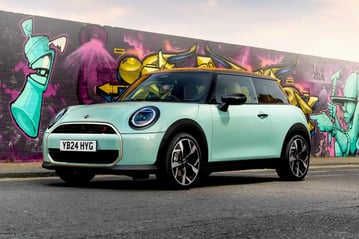- Carmoola
- Blog
- Cars and Gadgets
- What is car depreciation and how does it work?
- 🗞 Cars and Gadgets
- Last updated: Nov 8, 2024
- 8 Min Read
What is car depreciation and how does it work?
Written by

Verified by


See how much you can borrow in 60 seconds
| Representative Example | |
|---|---|
| Loan amount | £10,000 |
| Interest rate | 13.9% APR |
| 54 payments of | £246 |
| Total cost of credit | £3,284 |
| Option to purchase fee | £1 |
| Total payable | £13,285 |
In a nutshell, car depreciation is how much value a car loses over time. It’s the difference between a car’s value when it’s brand new, and its value when or if you come to sell it further down the line.
Just like death and taxes, depreciation is a fact of life. It affects the vast majority of cars, and the impact it can have depends on lots of things, including mileage, wear and tear, and the make and model.
How does car depreciation work?
New cars gradually lose their value over time. The amount of value they lose - and how quickly - varies widely from one make and model to another, but the biggest drop typically happens in the first year.
Depreciation starts from the moment you buy a new car, and the average new car will typically lose anything from 15-35% of its value in the first year alone. Pretty steep, right? After that, cars can go on to lose an average of 10% of their value every year.
New cars lose their value faster than used cars, because depreciation rates slow down as a car gets older. Even a two year-old car that’s been well looked after might cost much less than a brand new model of the same vehicle, because the older car will have already lost as much as 40% of its value.
The speed at which a car loses its value - known as the rate of depreciation - varies from one make and model to the next, and it’s affected by lots of factors. Here’s a general guide to give you an idea of how much you can expect your car’s value to drop during its first few years:
- Year 1 - a car depreciates by 15-35%, so it’s worth 65-85% of its original value
- Year 3 - a car depreciates by 40-60%, so it’s worth 40-60% of its original value
- Year 5 - a car depreciates by 60-70%, so it’s worth 30-40% of its original value
What factors affect car depreciation?
Depreciation affects almost all cars (apart from some rarer classics), but some cars depreciate more quickly than others. There are tons of reasons for this. The main things that affect car depreciation are:
- Mileage
- Condition
- Make and model
- Previous owners
- Service history
- Warranty
- Size
- Fuel economy
Mileage
On average, you’d expect a car to do around 10,000 miles a year. If a car has driven further than this, then it’ll be worth a bit less, because higher mileage means more wear and tear.
Condition
Any damage to a car’s bodywork, interior and exterior will bring its value down. On the other hand, a car that’s been well looked after and is in great condition is more likely to keep some of its value.
Make and model
Some makes of car hold their value better than others - for instance, leading car models from makes that have a reputation for being reliable will usually depreciate more slowly. On the other hand, if you’re buying a car that has a reputation for breaking down, it’ll be less attractive to potential future buyers, and will depreciate at a faster rate.
Previous owners
The fewer people who’ve owned the car, the better. If a car has had quite a few owners, you’re trusting that all those owners have looked after it. This means there’s more of a chance the car might have had issues in the past. You can check the number of previous owners on the car’s logbook or V5C registration.
Service history
If a car has a complete service history, it’s more likely to hold its value for longer, because there’s evidence that it’s been well maintained. The service book should have stamps or receipts showing that the car’s been serviced in line with the manufacturer’s recommendations.
Warranty
If there’s a long warranty left on the car, this can be a bonus when it comes to selling. Some manufacturers can offer up to seven years of cover, and this can help the car maintain a high resale value, and slow down the depreciation rate.
Size
Generally speaking, bigger luxury cars tend to depreciate faster than smaller, more practical cars, because they’re more expensive to run and maintain.
Fuel economy
The more miles you can get per gallon, the more attractive the car is to many buyers.
As well as the specifics of the actual car, the rate of depreciation can be affected by wider considerations too. For instance, environmental regulations might mean that a gas-guzzler with high emissions loses its value quickly, or a squeeze on the cost of living might make more economical cars more desirable, and therefore, more valuable.
Why does car depreciation matter?
Car depreciation matters because it affects how much you pay when it comes to buying a car on Personal Contract Purchase (PCP) or Hire Purchase (HP) finance agreements. The finance company will take the car’s projected future value into consideration when they’re working out what your final payment should be at the end of your agreement.
If you’re buying a new car, it’s sensible to think about when the car will see the biggest drop in its value. This tends to happen in the first few years, and then it typically slows down once the car is three or four years old. If you’re eyeing up a used car, think about whether you’re likely to want to sell it at some point.
The depreciation will have an impact on how much you can get for it when you sell it on - or trade it in for a new one - so try to work out how much it’s already depreciated, and what’s likely for the next few years.
Can you reduce the impact of depreciation?
It’s not all doom and gloom. You can’t stop your car from depreciating, but you can take action to help reduce the impact. Here are some things you can do to help maintain more of your car’s value for longer:
- Keep the mileage low
- Look after the car - repair any damage as soon as you can, and get the car serviced regularly, in line with the manufacturer’s guidelines. Keep all the car documents and service records together in one place.
- Avoid pimping your ride with unnecessary modifications like spoilers, wide wheels and flared wheel arches - these may give your car that little something extra, but they’ll make it harder to sell on in the future.
- Do your research before you buy a car - check how much values have dropped on older models and similar cars from the same manufacturer. This will give you an idea of potential resale value.
How to calculate car depreciation
To work out how much your car has depreciated, all you need to do is subtract the current value from its original list price. The difference between these two figures is the amount it’s depreciated.
The amount your car is worth now is sometimes called the residual value. You can get an idea of this by checking online for similar models, in a similar condition and with a mileage close to yours for sale.
If that sounds like a bit of a faff, you might want to use a depreciation calculator - there are plenty of these available online, many of them for free, and they’re a handy way to get an idea of how much your car’s depreciated.
FAQs about car depreciation
How much value will my car lose in 1/3/5 years?
How much value will my car lose in 1/3/5 years?
Every car depreciates at a different rate, based on its make and model, how many miles it’s done, and its condition, amongst other things. But in general, you can expect your car to lose 15-35% of its value in the first year, 40-60% by the third year, and 60-70% by the fifth year. So by the time your car is five years old, it’ll typically be worth 30-40% of its original value.
Which cars depreciate the least?
Which cars depreciate the least?
It’s hard to be specific, because a car’s exact depreciation rate depends on lots of factors, including mileage and condition. But generally speaking, luxury cars and electric vehicles tend to have high depreciation rates, whereas trucks and hybrids tend to keep their value for longer.
Can I stop my car from depreciating?
Can I stop my car from depreciating?
Unfortunately, you can’t stop your car from depreciating - it happens to all cars, whether we like it or not. But, you can slow down the rate of depreciation by looking after your car, getting it serviced regularly, repairing any damage as soon as possible, and keeping the mileage low.
How does depreciation affect my PCP/HP agreement?
How does depreciation affect my PCP/HP agreement?
Depreciation comes into play with car finance agreements in different ways. With a Personal Contract Purchase (PCP) agreement, your monthly payments are calculated to cover the depreciation of the car, so you only pay for the value the car loses during the term of your agreement. At the end, you can either make a final payment to own the car, return it, or you can use any remaining value towards a new PCP agreement.
With Hire Purchase (HP) agreements, you’re responsible for the full value of the car, so there’s a chance you could end up in negative equity if the car depreciates faster than you can pay it off. Negative equity means you owe more than the car’s worth.
See how much you can borrow in 60 seconds
| Representative Example | |
|---|---|
| Loan amount | £10,000 |
| Interest rate | 13.9% APR |
| 54 payments of | £246 |
| Total cost of credit | £3,284 |
| Option to purchase fee | £1 |
| Total payable | £13,285 |
Related articles
What Are the Top 5 Used Car Websites in the UK?
Thanks to the internet, searching for a used car in the UK is easier than ever before. You can simply head online, visit a used...
What Is GMFV in PCP Car Finance? Guaranteed Minimum Future Value Explained
GMFV, or Guaranteed Minimum Future Value, is the amount your lender estimates your car will be worth at the end of your PCP...
Does Financing a Car Build Your Credit?
Financing a car can build credit when you make payments on time, but it can damage your score if you miss payments or take on...

.webp?width=832&height=592&name=customer-support%20(1).webp)










.webp?width=400&height=285&name=online-shoppers-with-dog%20(1).webp)


.jpg?width=500&height=356&name=Vintage%20car%20going%20to%20an%20old%20town-1%20(1).jpg)





